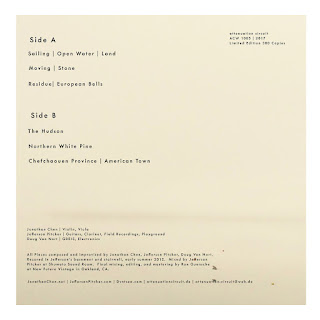Interview with Żaneta Rydzewska
1. There are many pieces of the internal puzzle what motivates an artist to do her/his work but I guess one of the most important one is the inspiration? How the inspiration evolved in your musical life/career?
It’s hard to say that inspiration in my case is the most meaningful. The most important thing for me is why I compose and what this piece or improvisation can bring to people who listen to it. Inspiration is always with me when I have the mental space to compose. But what is inspiration is changing depending on the situation, life chapter, or many factors.
2. As a musician you tend to think of scales, arrangements, techniques but you are quite consciously reaching somewhere else? How to express quite abstract ideas and put it into the language of music. What does it take and can you honestly say that you were successful in doing it?
It is beautiful and characteristic that it is natural "we can do anything" as composers of contemporary music. We can use the instruments in an unconventional way to get the sound effect we want. On the one hand, it is liberating, and on the other hand, this freedom imposes a great responsibility on us.
3. Each of the generations of musicians relies in one way or another on the matter of distribution. How does it influence you as an artist and does it change the way you feel about making music and moving forward with the whole process?
Sharing with others your own music, which is not simple or catchy, is a quite difficult experience. We can not expect that majority of listeners will be able to pat us on the shoulder and say “beautiful”. This is unreal. This type of music needs an open-minded listener looking for new experiences.
4. Which leads me to another question: who needs experimental music these days?
People who are looking for new and unique artistic experiences and those who sometimes want to break away from their musical routine. There are more and more such listeners. What I enjoy the most is conversations with the listeners who talk about their musical experiences while listening to my pieces. It is amazing how music moves us, how it changes us. I’m thankful I have this possibility to be an intermediary in this process.
5. You are an educated musician who is working also within a field of contemporary music – how does it affect you when it comes to finding some fresh ideas outside of academia? How is it with childlike discovery and wonder that is possibly quite important in working and experimenting in music and bringing new vibes, moods etc.
My musical education has always supported my ideas. I think it depends on what you do as a composer with the knowledge of music. You can use this knowledge as a tool to achieve your own musical goals. In my opinion, the most important thing in the process of music education is not to lose our curiosity.
6. You are trained in clarinet class. Do you often think of yourself as a clarinetist or is it only a function to something more wide in terms of your music vision?
I have been involved with the clarinet since childhood. I practice this instrument every day. I finished my MA in clarinet playing, now I use it mainly for improvisation. It is an important element for me every day, contact with sound, contact with the instrument and everyday discovering what today's improvisation will bring.
7. Plans for the future?
A lot! Continue to write pieces, write a doctorate, finish my studies in philosophy, create an ensemble specializing in improvised and electronic music, and establish the foundation supporting musical education.



Comments
Post a Comment